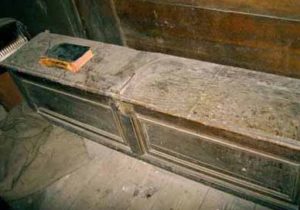“After this second trial I could not help seeing how little my Mass was worth; so, having extracted the Resurrexit, with which I was quite pleased, I burnt the rest.” —Hector Berlioz, Mémoires (tr. David Cairns)
The perfectionist young Berlioz used to rework his compositions intensely. If he still wasn’t happy with something, he’d destroy it outright. Despite two highly successful performances, he had grown dismayed with this piece, written in 1824 and premiered in July 1825. He gave up trying to fix it, harvested just the ‘Resurrexit’ movement, which he would recycle in three of his later works; and then he sent his Messe solennelle up in flames.
Or did he? Somehow, a copy of this remarkable early masterpiece by the 20-year old Berlioz managed to survive for over 150 years. It lay unrecognized among a small collection of random scores in a wooden chest in a chilly organ loft… until a busy Belgian organist, digging through the small trove of neglected scores, stumbled across one of the most significant finds in music history: a chunky, beat-up old score that turned out to be the lost Messe solennelle. 
We are grateful to Werner Gladines for creating an impressively complete and accurate account of this discovery, and to Monir Tayeb and Michel Austin for graciously allowing us to share this feat of documentary scholarship with the Sounds of Stow community. Learn more about the life and works of Berlioz on their wonderful Hector Berlioz website and Facebook page!
